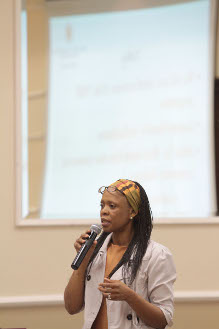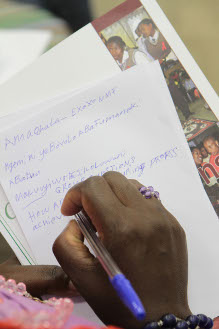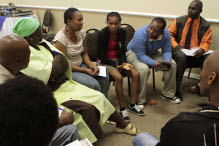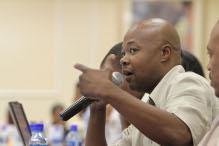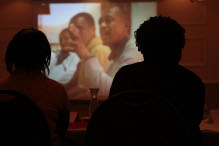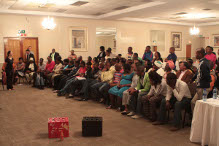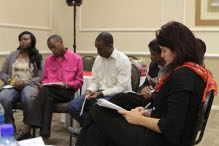
Foundation facilitators discuss the successes and challenges from the community conversations
November 17, 2010 – The Nelson Mandela Foundation hosted a two-day community dialogue on HIV/AIDS consultative forum at Cedar Park Hotel and Conference Centre in Johannesburg on November 15 and 16, 2010.
Day one of the forum was an opportunity for community conversation facilitators, stakeholders and partners to take stock of the programme and assess what has been achieved.
The forum was opened by Mothomang Diaho, head of the Nelson Mandela Foundation’s Dialogue Programme, who said: “I hope this forum will be an opportunity for us to share the lessons, challenges and opportunities from the current community dialogues using the Community Capacity Enhancement (CCE) methodology.”
Diaho briefly explained that the CCE methodology is a facilitated dialogue process that helps create safe spaces for community members to engage with one another and explore solutions to the challenges of HIV/AIDS.
“Facilitators need to be prepared to face the communities and not shy away from the difficult conversations. This reminds me that this is not easy work that we do. When we create safe space it is not an event. It takes hard work to create and build trust,” she said.
Regional facilitators Motlatsi Lekhuleni, Siviwe Khaba and Lesley Nkosi each gave a presentation on key issues that came out of the nine provinces and the lessons that they have learnt. Some of the main drivers of the spread of HIV, as identified through the process, were: lack of facilities at local clinics and recreation centres, gender inequality, prostitution, abundance of taverns and the lack of the regulation at these taverns, alcohol and drug abuse, high crime rates and a lack of communication between the young and the old.
Lukhuleni said, “Communities have the capacity to make their own decisions and find their own solutions to their problems ... There is no blanket solution, even in communities with similar concerns. If you give people capacity it becomes easier for them to implement their own solutions.”
Of continuing the programme in the future, Nkosi said: “We need to tap into the existing social capital ... the wounds of any community can be healed through community conversations.”
Following this introductory session, which gave insight into specific challenges that communities face in responding to HIV/AIDS, audience members had the opportunity to respond.
Motlatsi Matšosa from the I Can Foundation said: “It’s an engaging process and at the same time it’s an empowering process. [It] gives us the power to ... think and reflect on what the answers and solutions are.”
Guests then broke into five groups to discuss challenges in more detail, and to suggest partnerships to address these challenges and ways to continue conversations in the future.
A major issue to come out of discussions was the lack of psychological support. Given the nature of concerns that come up in the dialogue process, both community members and facilitators need debriefing and access to support structures. Most groups suggested that using existing social structures, including faith and non-governmental organisations, would be the best way to access such support.
Consistency of community attendance is another major challenge that facilitators face. It was suggested that by carefully scheduling conversations, facilitators could avoid a conflict of events, enabling more people to attend.
Facilitators also said that divisions between young and the old in the conversations process continue. All groups agreed that facilitators and implementing partners need to remain motivated and think creatively to ensure that attendance is high and that all sections of the community are involved in the process.
Guests then broke away into smaller groups to discuss the current approach to monitoring and evaluation. Denise Gray-Felder, CEO of the Communication for Social Change Consortium, said, “Community conversations can fundamentally change the way South Africa looks and deals with HIV/AIDS. Social change won’t happen unless you find out what’s working.”
The session was used as a refresher for facilitators on how to monitor and evaluate their progress, while also providing an opportunity to identify better ways to capture the progress made in various communities.
Following the day’s discussions, a dinner and awards ceremony was held to recognise all the work that facilitators had done through the HIV/AIDS community conversations programme.
To download the powerpoint presentation from the regional co-ordinators please click here (PPT).
To download the Mothomang Diaho’s presentation please click here.
